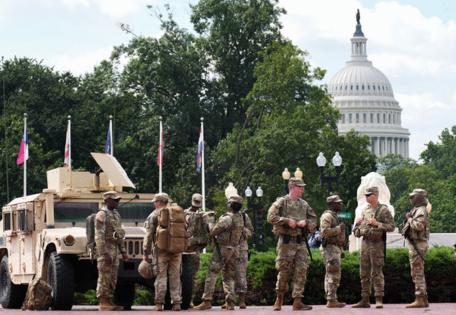Trump sued over Washington National Guard troop deployment
Published in News & Features
WASHINGTON — Washington officials have sued President Donald Trump over his deployment of thousands of National Guard troops in the nation’s capital, escalating local opposition to the administration’s moves to exert more control over the city’s day-to-day affairs.
The city contends that the mobilization of more than 2,200 troops since mid-August violates U.S. laws meant to bar the military from carrying out domestic law enforcement activities — a dynamic that D.C. officials described as an involuntary “occupation.” The lawsuit, filed in federal court on Thursday, also alleges Trump illegally called in National Guard units from other states.
It’s the second lawsuit D.C. Attorney General Brian Schwalb has filed challenging Trump’s push to federalize policing in the city. It comes on the heels of a U.S. judge’s ruling this week that Trump unlawfully deployed National Guard troops and U.S. Marines to Los Angeles, which the administration is appealing. Trump has warned that he’s considering deployments to other U.S. cities, including Chicago, prompting fierce pushback from Democratic state and local leaders.
“The deployment of National Guard troops to police District streets without the District’s consent infringes on its sovereignty and right to self-governance,” the city’s lawyers wrote in the complaint. “The deployment also risks inflaming tensions and fueling distrust toward local law enforcement.”
‘Lawful authority’
White House spokesperson Abigail Jackson said in a statement that “President Trump is well within his lawful authority to deploy the National Guard in Washington D.C. to protect federal assets and assist law enforcement with specific tasks. This lawsuit is nothing more than another attempt — at the detriment of DC residents and visitors — to undermine the president’s highly successful operations to stop violent crime in DC.”
The case was assigned to U.S. District Judge Jia Cobb, who was confirmed under former President Joe Biden and whose caseload includes another high-profile Trump administration fight over the president’s move to oust Federal Reserve Governor Lisa Cook. The city’s lawyers didn’t immediately ask for emergency intervention by a judge in the coming days.
Trump announced last month that he would deploy National Guard troops to Washington and invoked the city’s home rule charter to temporarily take over the Metropolitan Police Department. He declared a “crime emergency,” even though statistics maintained by the Justice Department, as well as the city, show that crime rates have dramatically fallen in the past year.
Schwalb first sued after Attorney General Pam Bondi issued a directive installing a Trump administration official as the leader of the local police force. Bondi withdrew that order after a federal judge in Washington suggested she was likely to rule that it exceeded Trump’s authority under the home rule law.
Washington Mayor Muriel Bowser has spoken out against Trump’s law enforcement takeover and defended the city’s right to self-govern but also sought to avoid full-out conflict with the president and his administration. Earlier this week, she issued an order authorizing longer-term local cooperation with federal authorities and wrote that “violent crime in the District has noticeably decreased” since August. But she’s also expressed opposition to the use of National Guard troops, saying it “hasn’t worked” and is inefficient.
Crime ‘emergency’
Speaking with reporters on Thursday, Bowser referred questions about the new lawsuit to Schwalb’s office — the attorney general is an independent elected official — and said her focus is on planning for how the city will handle the expected end of Trump’s crime “emergency” next week that allowed U.S. officials to exercise control over the police department.
While the 1973 Home Rule Act places time limits on the president’s takeover of the local police force, Trump controls Washington’s National Guard reserve force, setting the city apart from the rest of the country, where state officials exercise authority.
An 1878 law, the Posse Comitatus Act, and other U.S. regulations generally prohibit the use of active-duty U.S. service members from carrying out domestic law enforcement operations. Presidents historically have only activated National Guard troops after receiving requests from a state’s governor, though the chief executive can unilaterally order deployments in limited circumstances.
Posse Comitatus
D.C.’s lawsuit, like the case in Los Angeles, accuses Trump of violating the Posse Comitatus Act and another related law by directing National Guard units to address crime in the city, including ordering them to patrol neighborhoods while armed and deputizing them to carry out searches and arrests.
Schwalb’s office is also arguing that Trump unlawfully brought in troops from other states without first formally calling them into federal service and did so without getting approval from D.C. officials, which is required by an interstate emergency management compact that Congress approved.
“No American jurisdiction should be involuntarily subjected to military occupation,” the city’s lawyers wrote.
The case is District of Columbia v. Trump, 25-cv-3005, U.S. District Court, District of Columbia (Washington, D.C.).
_____
©2025 Bloomberg L.P. Visit bloomberg.com. Distributed by Tribune Content Agency, LLC.







Comments